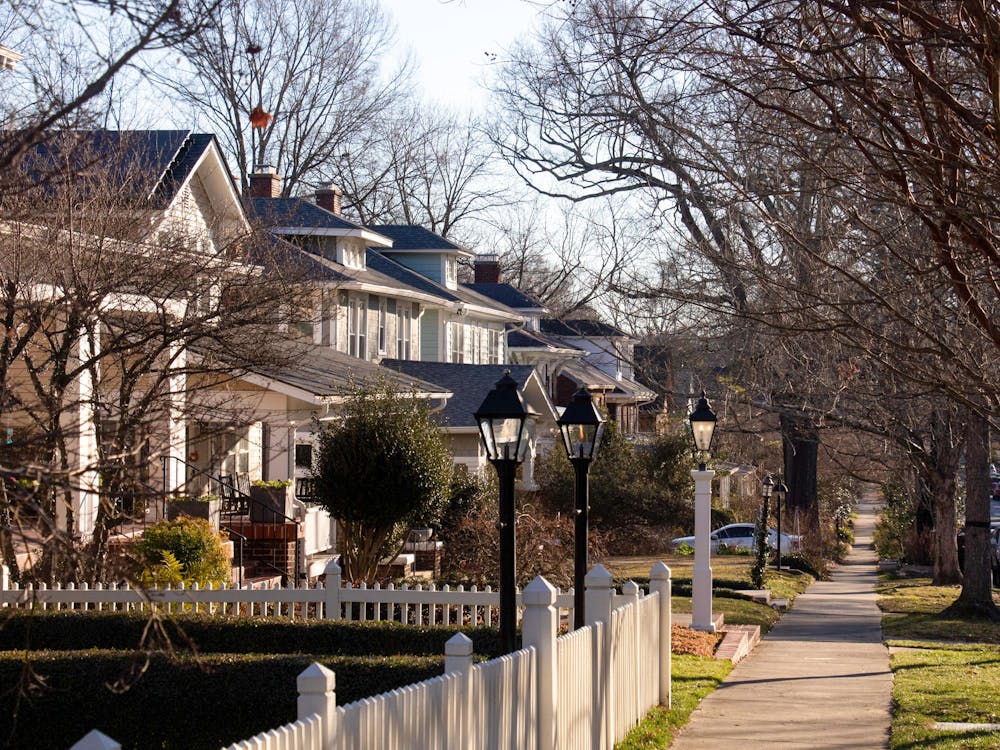In residential neighborhoods, fraternity houses often find themselves in the crosshairs of neighborhood scrutiny. Despite a recent uptick in police calls regarding fraternity activities, some residents near East Campus suggest that fraternity behavior may be undergoing a noticeable shift towards improvement.
In 2021, fraternity organizations disaffiliated from Duke’s Interfraternity Council following administrative directives to change the rush process. This prompted fraternities to host more off-campus events, which are typically parties held in private homes.
The following year, neighbors began a petition to remove Alpha Delta Phi from the Tuscaloosa-Lakewood neighborhood in Durham, characterizing the fraternity as a public nuisance “[violating] the city’s noise ordinances, [obstructing] traffic, [serving] alcohol,” and “[allowing] its members to guests to trespass on neighboring property.” Community members raised these concerns after several incidents, including a passenger’s death resulting from a student driving under the influence and allegations of sexual assault against the fraternity.
In 2023, another petition began — this time calling for seniors to also be required to live on campus.
The petition was put forth by Frank Hyman, former Durham City Council member and member of Durham Neighborhoods United. DNU formed in 2013 “to address the issues caused by Duke University off-campus fraternities and Student Living and Athletic Groups in the neighborhoods adjacent to the university.”
“We believe that requiring all undergraduates to live on campus is the only permanent solution for disruptive student party houses …” wrote Chair of DNU Alisa Johnson in an email sent to the Trinity Parks listserv.
But in 2024, residents of Trinity Park and Trinity Heights — the neighborhoods behind East Campus that are home to at least five fraternity houses — actually reported neutral or even positive sentiment towards their presence.
Residents in these neighborhoods live alongside fraternities Alpha Epsilon Pi, Theta Chi, Pi Kappa Phi, Sigma Nu and Alpha Tau Omega, as well as all-male selective living group Wayne Manor.
“You live next to a university, and you take advantage of the wonderful opportunities offered — both academic, outdoors, etc.,” said Kelly Witter, a Trinity Heights resident and three-time Duke alumna. “Universities come with students, and I think that our neighborhood should welcome the students into the neighborhood.”
It’s not just Witter who has such a view on fraternity houses in her residential neighborhoods.
Lynn Alexander has lived in Trinity Park for over 20 years. She says that large Greek Life parties used to be a problem, but that the situation has improved since then. She added that “everybody's just sort of relieved that it got so much better.”
She pointed to the 2006-2007 men’s lacrosse team incident as the impetus for change in the “behavior problems” typical for frat houses that host parties.
“I lived here through the lacrosse house debacle, and that was not a good time,” Alexander said. “It's improved significantly since then. That's because Duke bought many of those properties and rehabbed them into single-family homes. And now, it's night and day.”
She explained that, now, most issues with fraternities she sees are trash in the yard and furniture on the sidewalk.
“There's still a few houses … that can be problematic. But I haven't had to call the police in a long time,” she said.
An April 23 email from the Trinity Park listserv referred to a time “many years ago when the neighborhood had unruly frat houses” — a time of the past. Some residents in Trinity Park and Trinity Heights reported being unaware of the fraternity houses’ presence in the neighborhood at all.
But recent police reports paint a different story.
In late February, The Chronicle found that the number of calls by concerned neighbors increased for some fraternities since August 2023. This date corresponds with the time that Duke Student Affairs implemented the Good Neighbor Program, a directive aimed at “proactively [educating] Duke students about Duke University's and the City of Durham’s expectations for living off campus” in certain partnered neighborhoods — including Trinity Heights and Trinity Park.
As a part of the Good Neighbor Program, Elinor Landess, assistant dean of students and director of off campus and community life, distributes information to the neighborhood community members. This includes notices of elevated noise when campus may be loud due to certain events.
Landess did not respond to comment in time for publication.
The Good Neighbor Program also distributes information on student behavioral conduct, including flyers and emails reaffirming “the University's commitment to actively address issues that may arise with our students in the community.”
One flyer distributed to Trinity Park residents via the listserv urged neighbors to call Duke and Durham police “if problems arise with student neighbors.” Additionally, the flyer reads that “[Duke Student Affairs is] telling students that gatherings should be 30 people or less, should just be friends and should not have amplified sound outside.”
However, Witter said that some Trinity Park residents may overstate the disturbances caused by fraternities.
“Neighbors tend to call and just say there's noise with no quantitative information whatsoever,” she explained. “The people who complain can be the loudest and they're not representative of everyone's views.”
“One of the big reasons I picked Trinity Park was the personal proximity to East Campus and all the amenities that Duke offers. I feel super lucky to live so close,” she said. “It brings me joy when I see students walking around.”
Get The Chronicle straight to your inbox
Signup for our weekly newsletter. Cancel at any time.

Claire Cranford is a Trinity first-year and features managing editor for the news department.

